Omega 3 fatty acids are excellent for your long-term health, but the most common sources are all animal-based.
A vegan omega 3 supplement uses only plant sources to derive its omega 3 fatty acids, so they’re cruelty free and still just as beneficial for your well-being.
Need to find a quality omega 3 supplement that’s vegan-friendly, but still packs the same punch as fish oil?
Not to worry; our researchers have evaluated and ranked the ten best vegan omega 3 supplements on the market.
Research
Rankings
1. Performance Lab Omega 3
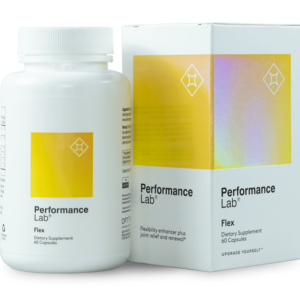
Click here for the lowest price
Performance Lab Omega 3 offers 1100 mg of omega 3 fatty acids per serving, delivered in the world’s first vegan, carrageenan-free softgels.
It provides users with the ideal 2:1 ratio if DHA to EPA, with 600 mg of DHA and 300 mg EPA of the super clean, life’s™OMEGA algal oil in each serving.
This Omega 3 is; non-GMO, eco-friendly, GMP certified, 3rd party banned substance tested and free from allergens, synthetic additives, soy, and gluten.
All that without carrageenan in the softgels – unlike other Omega 3 products on the market.
We believe this is the cleanest and highest quality Omega 3 on the market, making it our #1 Omega 3 supplement.
2. NutraVege Omega-3 Plant
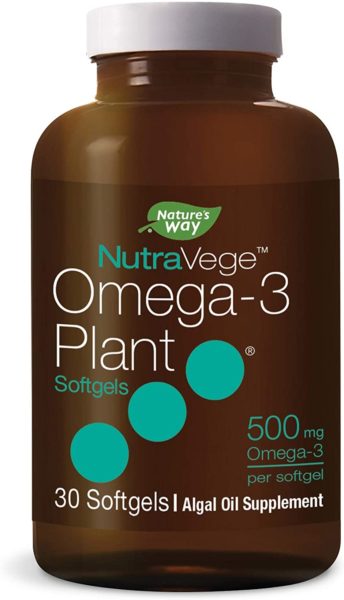
Nature’s Way NutraVege Omega-3 Plant makes a high-quality vegan-friendly omega 3 supplement that delivers 500 mg of omega 3 fatty acids per capsule, with an even split of 300 mg of DHA and 150 mg of EPA.
Both the overall omega 3 and the DHA/EPA content are fantastic, and combined with the pretty good supplement design, this supplement is one of the best overall vegan omega 3 product on the market right now.
3. Testa Omega-3
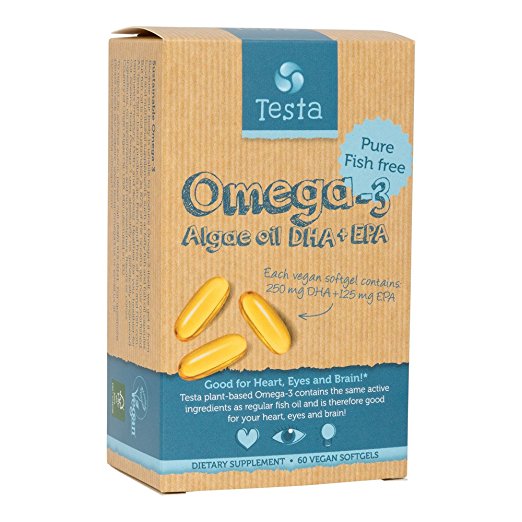
Testa Omega-3 contains a high and well-balanced dose of omega 3 fatty acids. With 450 mg of omega 3 per capsule, and 250 mg of DHA plus 125 mg of EPA, it’s plenty potent.
There are a few other ingredients, like rosemary and carrageenan, that help with capsule stability, but that aside, it’s a pretty pure product. In terms of delivering a concentrated dose of the most beneficial omega 3s, Testa Omega-3 is a real winner.
4. Ovega-3 Plant-based Omega-3
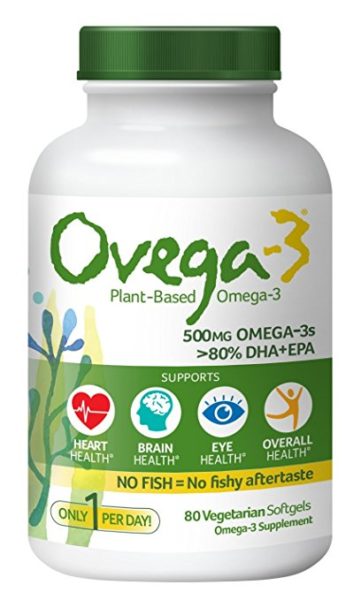
Ovega-3 Plant-based Omega-3 contains quite a high dose of omega 3s, at 500 mg per capsule. Moreover, 270 mg of this is DHA and 135 mg of this is EPA.
The downsides with this supplement is that purists won’t like the additives like rosemary and sorbitol used to mask some of the oily flavor and scent.
5. Nordic Naturals Algae Omega
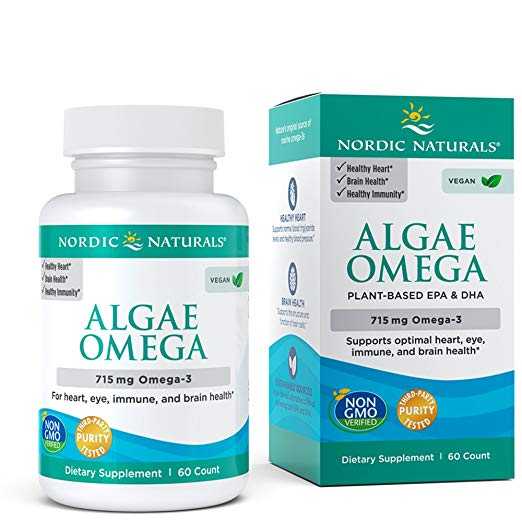
When it comes to raw omega 3 content, Nordic Naturals Algae Omega is a solid contender. Each capsule has about 350 mg of omega 3s, with 200 and 100 mg comprised of DHA and EPA, respectively.
Just 50 mg are non-EPA/DHA omega 3s. There are a few additives for stability, which purists might scoff at, but just about everyone else can be happy with this supplement.
6. Zenwise Health Vegan Omega-3
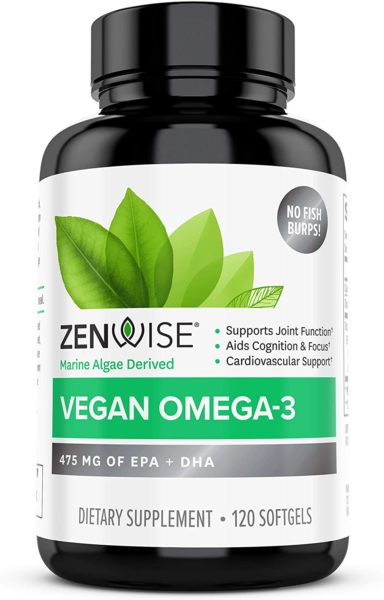
Zenwise Health Vegan Omega-3 has a total of 225 mg of omega 3 fatty acids per capsule, but unlike many of its competitors, all of its omega 3s are either DHA or EPA.
There are no other fatty acids, so you are getting the best bang for your buck when it comes to active ingredients. This algae-derived omega 3 is an excellent choice for a concentrated dose of omega 3s without any additives.
7. Garden of Life Supercritical Algae Omega-3
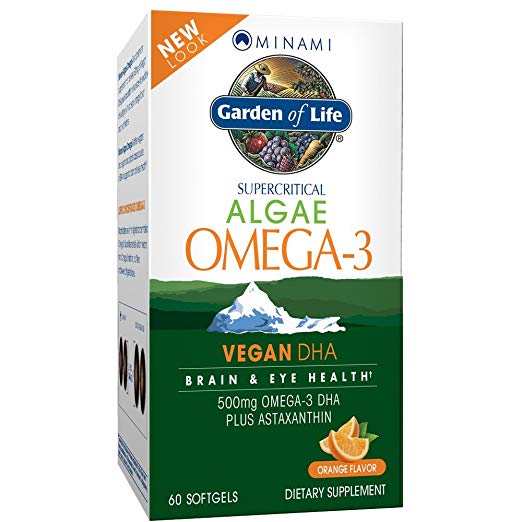
Garden of Life Supercritical Algae Omega-3 delivers only DHA, but it does so in a highly concentrated dose.
With 250 mg of DHA per capsule, along with the powerful antioxidant astaxanthin, it’s a good way to get the benefits of DHA, though many people might want to opt for a supplement that’s got EPA in it as well.
8. Purity Products Omega 3-6-9
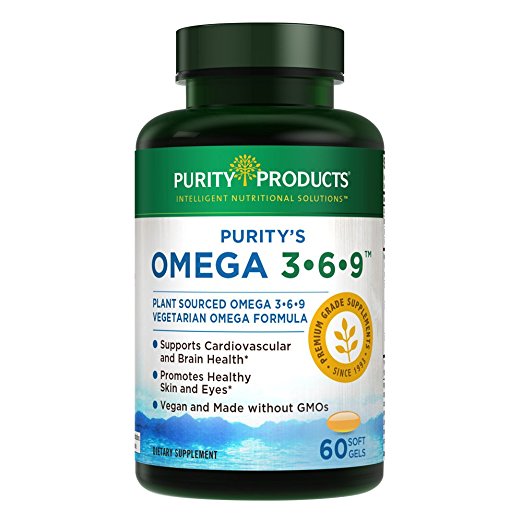
Purity Products Omega 3-6-9 is good for those who ascribe to diets that strive to balance omega 3, 6, and 9 fatty acids.
This supplement contains each in roughly a 5:2:7 ratio All of these omega fatty acids come from vegan friendly sources, and unlike many competitors, Purity Products uses strictly plant sources, not algae, for its oils.
The omega 3 comes primarily from flax, which is a great source of healthy fats, so if you are looking to balance out your omega 3, 6, and 9 ratios, this supplement is a decent pick. On the other hand, if all you want is omega 3s, there are better options out there for you.
9. DEVA Vegan Omega-3 DHA
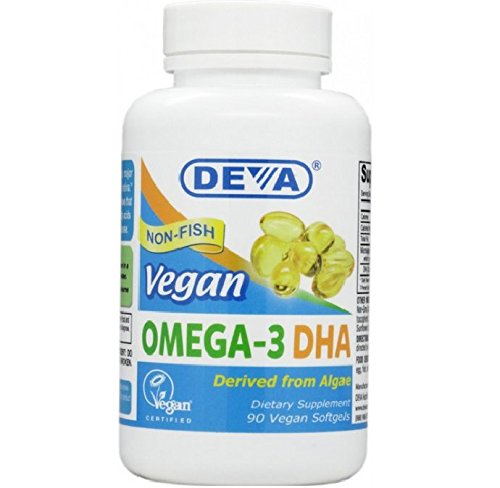
DEVA Vegan Omega-3 DHA isn’t quite the complete omega 3 supplement you’d like. Since EPA has been found to have beneficial health effects too, you’re far better off striving for an omega 3 supplement that has both EPA and DHA.
The sole use of this supplement would be to boost your DHA intake specifically, since the DHA dose alone isn’t that high.
10. Freshfield Vegan Omega 3
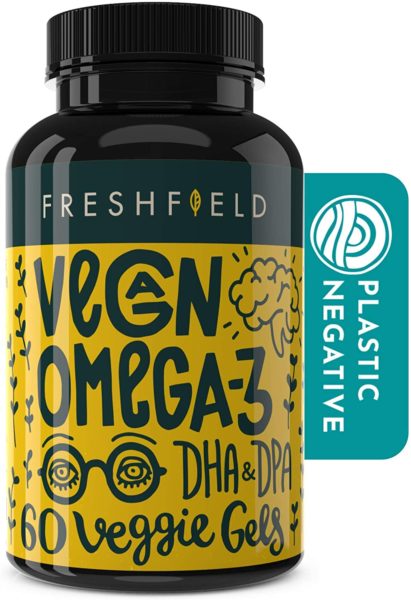
Freshfield delivers a powerful 500 mg of omega 3 fatty acids per capsule, with 240 mg of of this total comprised of DHA and 25mg of DPA.
There are very few additional ingredients, and the omega 3s are derived from vegan-friendly algae oil, making this a solid choice.
Category winners
Best vegan omega 3 overall: Performance Lab Omega 3
Most vegan omega 3 supplements have a fairly low dosage of fatty acids—not Performance Lab. Its omega 3 fatty acid content is fantastic, and a large proportion of it is EPA and DHA. To top it off, it’s extremely pure: aside from omega 3s, the only other ingredient is its vegan softgel capsule.
Best vegan omega 3 for heart health: Performance Lab Omega 3
Performance Lab is unbeatable among vegan omega 3 supplements when it comes to DHA and EPA content, and for heart health, nothing beats having a high concentration of these two compounds. That’s why it’s our recommendation for cardiovascular health.
Best vegan omega 3 for older adults: Testa Omega-3
With a balanced EPA and DHA content, very few additional additives, and 450 mg total fatty acids per capsule, Testa Omega 3 is a solid choice if you don’t think you need the higher-capacity dosage found in a top-ranked vegan omega 3 supplement.
Best vegan omega 3 with EPA and DHA: Performance Lab Omega 3
Many nutritionists believe that the benefits of omega 3 fatty acids can be traced to two specific compounds, DHA and EPA. Performance Lab is the king of EPA and DHA content for vegan supplements, making it the right choice if these two are your priority.
Best vegan omega 3 for joints: NutraVege Omega-3 Plant
NutraVege Omega-3 Plant has a very solid ratio of EPA and DHA, plus other omega 3 fatty acids that can help support joint health, which is why it’s our recommendation for a plant-based omega 3 supplement for knees, ankles, hips, and more.
Best vegan omega 3 without carrageenan: Performance Lab Omega 3
If purity matters to you, you don’t want emulsifiers like carrageen in your vegan omega 3 supplement. Performance Lab is the way to go on this front; aside from algae-derived fatty acids, its vegan-friendly gel capsule is the only ingredient.
Who should buy vegan omega 3?
Vegan omega 3 supplements can be bought by people who follow a vegan diet to ensure they don’t suffer from EPA and DHA related deficiencies.
Vegan omega 3 supplements are also great for individuals looking to improve brain function, lower inflammation, and improve symptoms of depression.
How we ranked
DEVA Vegan Omega-3 DHA didn’t rank that high because it only included DHA, not EPA (which is often lacking in vegan diets as well). Healthy Fats Co Algal DHA Oil also ranked low on our list for proving a vegan omega 3 supplement without EPA. Purity Products provided a better vegan omega 3 supplement but included omega’s 6 an 9 as well. The standard western diet is already high in these omega’s, making them somewhat pointless to consume. Garden of Life provided a potent vegan omega 3 product but fell short because it provides only DHA. However, it did include the powerful antioxidant astaxanthin, which is why it ranked in the middle of the pack.
Zenwise Health and Nordic Natural’s contained both EPA and DHA, making it an ideal vegan omega 3 supplement. They ranked in the middle of the pack because of a few additives that were used for stability. Ovega-3 had the same issue, providing a potent dose of vegan omega 3’s (500mg per capsule), but included various additives to mask the taste. While not the most additive filled product, we preferred products that were filler-free.
For a concentrated dose of vegan omega 3’s, Testa has your back. It provides 250mg of DHA and 125mg of EPA to support vegan health. It does include natural additives like rosemary to mask the taste but overall is a solid product. Breaking our top 2, Nature’s Way provides a high-quality vegan omega 3 supplement that is clean and pure. It contains 300mg of DHA and 150mg of EPA, making it one of the most potent one the market.
Our top pick Nested Natural’s includes 100mg of green tea extract to increase the antioxidant power of their supplement. It also provides 700mg of 100% algae-oil-derived omega 3 fatty acids, making the most potent product on our list. Both EPA and DHA are included in this product, making it perfect for vegans.
Benefits
Omega 3 fatty acids may reduce your risk of heart disease. A vegetarian or vegan diet is already a good choice for heart health, as it eliminates many of the foods associated with an increased risk of heart disease, like processed and red meat products.
However, evidence suggests that adding omega 3s with a supplement could further reduce your risk of heart disease. Given the massive popularity of omega 3 supplements, there have been a huge number of observational studies and randomized clinical trials assessing the ability of these supplements to affect risk of heart disease.
Not all results are positive; for example, one meta-analysis of ten studies found no significant benefit to omega 3 supplementation (1).
Still, the most recent scientific advisory released by a panel of national experts on heart disease commissioned by the American Heart Association in 2017 recommends using omega 3 fatty acid supplements to prevent heart disease, particularly in people at high risk for heart attack (2).
This evidence is based on a number of very large and high-quality randomized and placebo-controlled trials. Though the reduction in risk is fairly modest (circa 10%), given the excellent safety profile of omega 3 fatty acid supplements, the cost-benefit analysis clearly favors using an omega 3 fatty acid supplement.
A vegan omega 3 supplement could help maintain cognitive function as you get older. Heart health is not the only public health crisis that might be helped by omega 3 fatty acid supplements.
Thanks to their ability to reduce inflammation and oxidative damage, there is a considerable interest in using omega 3 fatty acids to prevent cognitive decline and neurodegenerative diseases like Alzheimer’s.
A study published in 2008 in the journal Progress in Neuro-Psychopharmacology and Biological Psychiatry tested the effects of an omega 3 supplement that provided a high dose (1800 mg per day) of total omega 3s, or a placebo with no omega 3 content, to a small group of older adults who had already been diagnosed with mild cognitive impairment or Alzheimer’s (3).
Though the study was small, the researchers found positive benefits for mild cognitive impairment, though not Alzheimer’s.
Later research, such as a paper published in 2018 in the Journal of the Prevention of Alzheimer’s Disease, has explored the biological reasons behind why an omega 3 supplement might be beneficial for cognitive function (4).
This study examined in detail one such hypothesis: that omega 3 fatty acids deposit on the membrane surface of red blood cells, which leads to their proliferation throughout the body.
The researchers even suggest that omega 3 content on red blood cell membranes might be a biomarker for long-term omega 3 intake, helping to avoid one of the problems that’s plagued many clinical trials to date—their short duration (usually, only a few years).
Omega 3 fatty acids could be used to treat depression. Given the connection between inflammation, cognitive decline, and omega 3s, you might wonder whether other diseased states of the brain could be related to this same mechanism.
In light of new evidence connecting depression to systemic inflammation of the body, nutrition researchers have drawn a connection between this same mechanism and symptoms of depression.
It turns out that there is a good body of fairly promising research on using omega 3 fatty acids to treat symptoms of depression. One such study was published in 2014 in the journal PLoS ONE by a team of researchers at the University of Catania in Italy (5).
This investigation pooled the results of 19 different studies on using omega 3 fatty acids to treat depression, and the researchers found a moderate and significant benefit to using omega 3s, both in patients with depressive symptoms with no diagnosis of major depressive disorder, and in patients who had been diagnosed with major depressive disorder.
Further analysis found promising results in patients with bipolar disorder, too. The authors recommended omega 3 fatty acids as an adjunctive treatment, not a replacement for standard treatments for depression, but with the excellent safety profile of omega 3s, they appear to be a very promising way to help reduce symptoms of depression.
Side effects
Vegan omega 3 supplements are quite safe, with no significant adverse effects aside from a mild oily taste and scent.
Some nutritionists expressed concerns that omega 3 fatty acids could increase risk of bleeding, due to their blood thinning effects, but according to an article published in 2007 in the American Journal of Cardiology, these theoretical concerns have not panned out in real clinical trials, even in people already taking blood thinners like warfarin (6).
Further, though high consumption of fish carries some risks of heavy metal or dioxin contamination, all the top quality vegan omega 3 supplements go through extensive filtering and testing to ensure they are free of these toxic compounds.
Recommended dose
Given the massive number of studies on omega 3 and health, the optimal dosage is fairly well understood.
Current recommendations published in the journal Circulation suggest supplementing with 1000 mg of total omega 3s every day, a large portion of which should be DHA and EPA (7).
If you are at higher risk for heart disease, doses of up to 2000 to 4000 mg of omega 3s per day might be the way to go.
For other conditions, like depression or for warding off cognitive decline, recommendations are less clear, but most studies use doses in the same general vicinity (i.e. 1-4000 mg per day).
FAQ
Is Perilla oil a good source of vegan omega 3s? Per tablespoon, perilla oil is one of the most potent ALA sources, providing nearly 9000mg. Perilla oil should not be used in cooking as the polyunsaturated fats it contains can oxidize with heat, which forms free radicals that can damage cells.
Do vegan omega 3 supplements work? Yes, vegan omega-3 supplements can work, but not as well as normal omega 3 supplements like fish oil. Most vegans and vegetarians prefer algal oil as an omega 3 supplement, as it’s an all-natural source of DHA and EPA, the two omega 3s that are difficult to consume in a vegan diet. Fish oil is still considered the gold standard when it comes to omega 3s, and you might want to consider adding fish oil to your diet if you severely lack omega 3’s – even if you’re vegan.
How do vegans get omega 3 fatty acids? It’s difficult for vegans to get omega 3s in their diets because omega 3s are most prevalent in meat and animal products. Certain seeds, nuts, and oils are a vegan’s best source of vegan omega 3s, since they contain decent levels of ALA – which is one of the omega 3 fatty acids that all humans need to function properly. However, they don’t often include DHA and EPA, which are essential to human health.
Are hemp seeds a good source of vegan omega 3s? Hemp seeds are a good source of vegan omega 3s and contain around 6,000 mg of ALA per ounce. Hemp is also a great source of protein, magnesium, iron, and zinc.
When is the best time to consume vegan omega 3 supplements? Vegan omega 3 supplements can be taken morning or night. The only recommendation would be to consume your vegan omega 3 supplements with food since taking it on an empty stomach can cause GI issues like nausea, diarrhea, and flatulence.
Which plants are high in vegan omega 3s? It’s not uncommon for some plants like algal oil, hemp seed, and chia seeds to have decent levels of omega-3 fatty acids. However, it’s often limited to ALA and doesn’t include the essential EPA and DHA.
Why are vegan omega-3 fatty acids so important? A vegan omega 3 supplement is a great way to improve your heart health, decrease overall inflammation, and increase your resistance to chronic disease. Omega 3 fatty acids are one of the heavy hitters when it comes to supplements for health and longevity, ever since researchers discovered that high fish consumption was associated with a long life and good health.
Fish oil, being extremely rich in omega 3 fatty acids, have understandably become one of the most popular categories of supplements. Vegans and vegetarians, however, are in somewhat of a bind, as are people who would rather not contribute to overfishing and unsustainable impacts on the ocean ecology.
Fortunately, it’s possible to extract omega 3 fatty acids without harming fish at all. Since fish derive their omega 3 fatty acids from the algae they consume, it’s possible to harvest or grow algae, a water-borne plant, and extract and concentrate the omega 3 fatty acids directly.
While other plants, like flax seeds, are also high in omega 3s, algae oil is by far the most popular source for vegan omega 3, which looks like it offers the same health benefits as fish-derived omega 3s.
What are omega 3 fatty acids? Omega 3s are essential fat that all people need to be consuming to achieve a state of optimal health. For the most part, omega 3 seems to help reduce the effects associated with aging and improve the quality of life by reducing systemic inflammation.
Omega 3s can also improve your cardiovascular health, reduce your risk of developing heart disease, and even lower blood pressure. Regarding the brain, they help to prevent the development of certain neurodegenerative disorders like Alzheimer’s. Omega 3s can also help with fetal development making them one of the most important foods you can consume (8).
Do vegans need supplements for DHA and EPA? It’s recommended that vegans supplement with vegan omega 3 supplements since their diets tend to lack EPA and DHA. In reality, vegans have almost zero DHA sources in their diet – which can be a major issue. With that said, you should keep in mind that plant-based omega 3 sources are not nearly as effective as fish oil products. They’ll help, but they won’t provide you the same benefits that you would be receiving if you took regular fish oil.
Can vegan omega 3 supplements upset your stomach? Typically, there’s no risk of an upset stomach when taking any type of omega 3 supplement unless you’re taking the supplement on an empty stomach. Taking it with food almost always clears any GI issues. There is a possibility that you might develop acid reflux when you take vegan omega 3 supplements, but that is rare as well. If you’re worried about the gastrointestinal effects of omega 3 supplements, you should talk to your doctor to see if there are any other alternatives.
Are brussel sprouts a good source of vegan omega 3s? Brussel sprouts are a good source of fiber, vitamin K, and ALA, which is an omega 3 fatty acid. Raw brussel products contain about 1mg of ALA per 1g of brussel sprout. Brussel sprouts have also been shown to lower heart disease by 16% (9).
Can your body properly absorb vegan omega 3s? Yes, your body can absorb plant-based omega 3s, but is limited in what it can use. This is because most plant-based omega 3s only contain ALA, not the much-needed DHA and EPA as well. If you are choosing to take a vegan omega 3 supplement, you should make sure it contains DHA and EPA.
What is a vegan omega 3 supplement? Vegan omega 3 supplements are plant-based supplements that provide omega 3s, mainly ALA. Some of the more popular sources of omega 3s from plants include algal oil, flaxseed, walnuts, and echium (10).
Unfortunately, the ALA you receive from plants is not able to be converted into the much needed DHA. With low levels of DHA, you’re less likely to experience the positive effects of omega 3 fatty acids like improved brain health, eye health, lowered inflammation glowing skin. Some of the more popular sources of omega 3s from plants include algal oil, flaxseed, walnuts, and echium (11).
Is omega 3 missing from vegan diets? When you’re on a vegan diet, you’re more often exposed to one particular omega 3 fatty acid: ALA. The issue with the vegan diet is the lack of DHA and EPA, which are the other two major omega 3s that your body desperately craves. Vegan omega 3 supplements are there to provide the body with the missing DHA or EPA you need without exposing you to animal-based products.
Are walnuts a good source of vegan omega 3s? Walnuts are 65% fat by weight and provide over 2500mg of ALA per ounce. They do lack EPA and DHA, making them a less than ideal choice for vegans.
Does it matter which vegan omega 3 supplements you buy? Yes, it matters a lot since the vegan diet can cause a lot of deficiencies. Specifcally, you want to look for a plant-based product that contains both EPA and DHA. It’s also essential to choose products that are minimally processed and contain no fillers and additives.
Are chia seeds a good source of vegan omega 3s? Yes, chia seeds are a great health food that offer a ton of nutrients for vegans, including nearly 5000mg of omega 3’s in just one ounce. Chia seeds have even been shown to improve good cholesterol in the body. Unfortunately, they only include ALA, which can be an issue for people sho don’t have access to EPA and DHA (12).
Is algae a good source of vegan omega 3s? Algae supplements are known for being extremely nutrient-rich and can drastically improve the current status of your health. Algae supplements are an excellent source of vegan omega 3s since they contain both EPA and DHA – the omega 3 fatty acids most vegans are deficient in.
Is it worth it to take vegan omega-3 supplements daily? If they consume fish, the average person doesn’t need omega 3 supplements (vegan or regular) daily. However, vegans should consider adding omega 3 supplements to their diets, since their diet often lacks them.
What do omega 3s do for the body? Omega 3s are known for their ability to impact the heart and its functioning – reducing your risk of developing cardiovascular conditions while also helping to lower your blood pressure.
Omega 3 fatty acids are also able to protect your brain and eyes. In the long-term, this can help you to maintain your vision and also prevent the development of conditions like Alzheimer’s and dementia.
Are flaxseeds a good source of vegan omega 3s? Yes, flaxseeds are an excellent source of omega 3s, providing over 6300mg per ounce. Flaxseeds also provide good amounts of protein, fiber, and magnesium.
Are vegan’s the only people who need omega-3 fatty acids? Vegans aren’t the only ones that need omega 3’s. In fact, all people need omega 3 fatty acids to boost support their health and live a healthy life.
In terms of using supplements, vegans tend to need plant-based omega 3 supplements more because their diet naturally lacks two of the three omega 3 fatty acids EPA and DHA. Without all three of these omega 3 fatty acids, your health can suffer dramatically. All vegans should consider adding a plant-based omega 3 supplement to their diets if they value their health in general.
Are plant-based omega 3 as good as fish oil? What makes fish oil the perfect source of omega 3s is the fact that it contains EPA, DHA, and ALA, which are the three main omega 3 fatty acids the body requires to function optimally. If you’re vegan and refuse to consume animal products, then you should consider an algal oil product to get your recommended dose of EPA and DHA.
Is algal oil a good source of vegan omega 3s? Algal oil is probably one of the best sources of vegan omega 3s because it contains both EPA and DHA.
Related articles
Recap
A vegan omega 3 supplement is a great way for vegetarians, vegans, and ocean-conscious people to get all of the health benefits of omega 3 fatty acids.
These could include modest protection against cardiovascular disease, staving off cognitive decline, and even treating depression symptoms and major depressive disorder, in conjunction with usual care.
Even though the benefits for some conditions are modest, vegan omega 3 supplements are free from any adverse effects, making the cost benefit analysis pretty favorable.
Optimal doses range from 1000 to 4000 mg of total omega 3 fatty acids per day, depending on your level of risk for heart disease.
The right vegan omega 3 supplement can set you up for all of these benefits without having to make any dietary or ethical compromises.
For BodyNutrition’s #1 vegan omega 3 recommendation, click here.